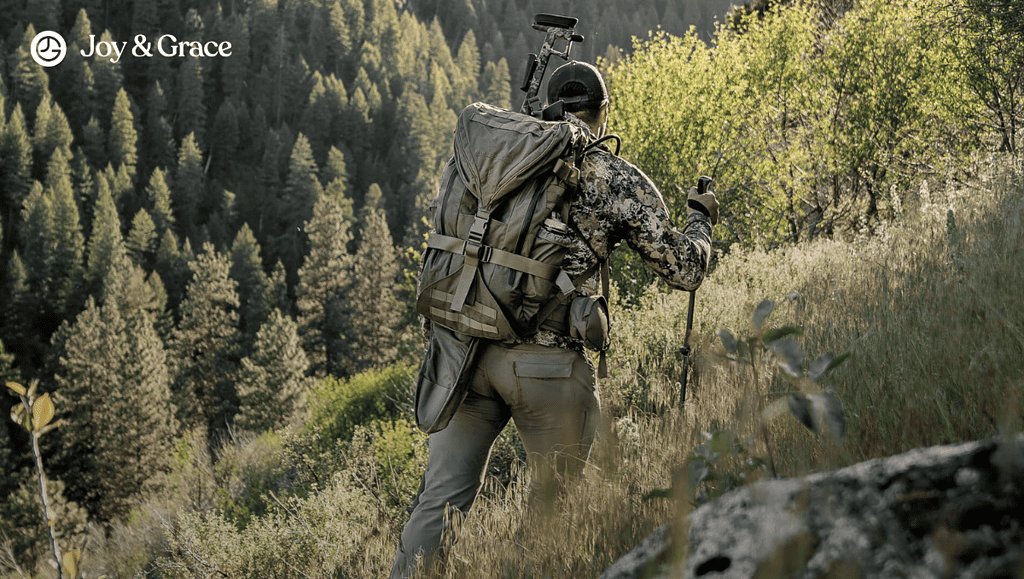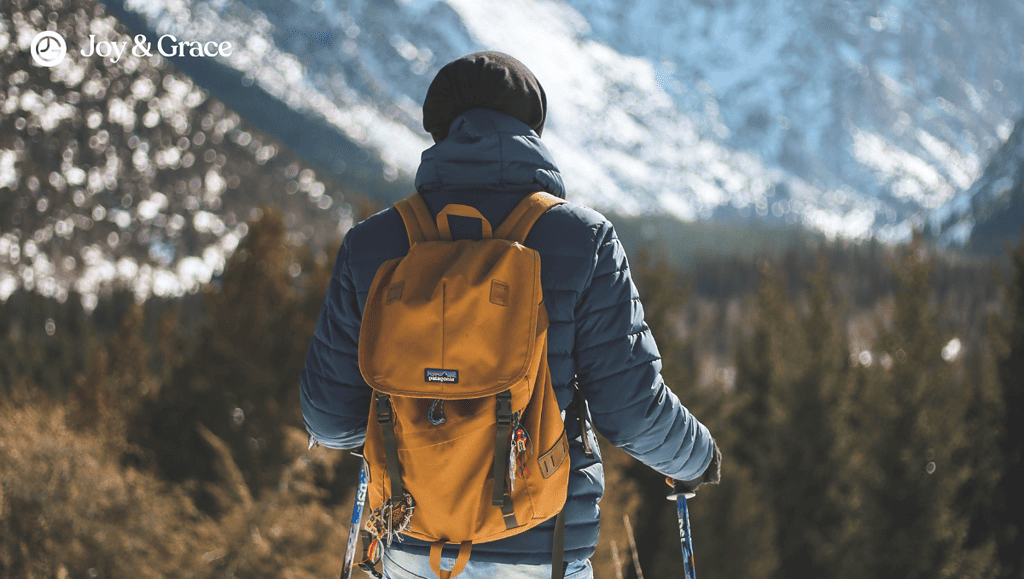Picture this: weary travelers hobbling off planes and trains or students limping home from university, grumbling about their throbbing and stiff necks and shoulders. We've all been there, right?
You may have heard carrying a backpack is better than a one-strapped bag. And while that's certainly true, it's not a magical solution to pain-free travel. In fact, if you're not careful, that trusty backpack could end up feeling like a ton of bricks on your poor, unsuspecting shoulders.
Let's face it, hauling around heavy backpack loads can be a real pain. But fear not, backpackers and academics, for we have some advice to share. Done right, you'll not only spare yourself the agony of aching shoulders but also impress your fellow backpack haulers with your effortless grace and poise.
Can Carrying A Heavy Backpack Cause Shoulder Pain?

There is no doubt that carrying a heavy backpack can indeed cause shoulder pain.
“When a backpack is too heavy or incorrectly worn, the force can place the body in an unnatural position. This can lead to arching or flexing the back, and overworking muscles in an effort to compensate, which can lead to bad posture, rounding of the shoulders, and even falls.”
– Gary Shapiro, MD, an orthopedic surgeon at Illinois Bone & Joint Institute (IBJI)
And, we've all been there - trudging around with a backpack that seems to weigh more than we do. It's like we're carrying the weight of the world on our shoulders when in reality, it's just a few textbooks, a laptop, or maybe some hiking gear.
No matter what you've got packed in your backpack, carrying too much weight can take a toll on your body. Here are some negative effects that you should keep in mind:
Poor Posture
When it comes to carrying a heavy load on your back, how you do it matters. If you don't distribute the weight properly, you might end up looking like you're in a tug-of-war with gravity, with the heavy weight yanking you backward.
Because of this, you may end up leaning forward or adopting a hunched or rounded shoulder posture. This puts excessive stress on the muscles and joints in the shoulders.
According to a study, carrying a heavy backpack can also affect how you walk and may contribute to developing chronic back pain in the future.
Uneven Weight Distribution
Aside from its effects on posture, uneven weight distribution can cause one shoulder to bear more weight than the other. This can lead to muscle imbalances and pain.
Overloaded Shoulders
When a heavy backpack is carried, it can cause an excessive load on the shoulder muscles and joints. This can lead to muscle fatigue, strain, and even injury.
Nerve Compression
Carrying heavy packs can lead to nerve compression in some cases. When a backpack is loaded unevenly or worn for extended periods, the excess weight can compress the nerves that run through the shoulders and down the arms. This is especially true if the backpack is worn too tightly. We’ll be talking more about this further down the article.
What Muscles Does Carrying A Heavy Backpack Work?
Carrying a heavy backpack works a variety of muscles in your body, including:
- Shoulder muscles
Carrying a heavy backpack places a lot of strain on the shoulder muscles. These include the following:
- Deltoids
- Rotator cuff muscles
- Trapezius muscles
- Back muscles
The back muscles are also engaged when carrying a heavy backpack. These muscles work to support the backpack's weight and maintain proper posture. These are the following:
- Erector spinae
- Latissimus dorsi
- Rhomboids
- Core muscles
The lower back and abdominal muscles are also activated when you are carrying a backpack. These muscles help to maintain good posture and balance.
- Leg muscles
Walking or hiking with a heavy backpack also requires the use of the leg muscles. These include the following:
- Quadriceps
- Hamstrings
- Calf muscles
Can Carrying A Heavy Shoulder Bag Cause Shoulder And Neck Pain?

Similar to backpacks, a shoulder bag can also be a bag full of problems. Since you typically carry a shoulder bag on only one side, it’s more likely to cause uneven weight distribution across the back muscles. This can lead to strain and restricted blood flow at the shoulder.
Aside from that, carrying a heavy shoulder bag with straps that don't have any padding can cause extra pressure on the nerves in your neck and shoulders. This can lead to feelings of pain, tingling, stiffness, numbness, or tightness in those areas.
If you do decide to use a handbag or shoulder bag, make sure to keep it light. According to a study, handbags should not exceed more than 10% of your body weight.
Can Wearing A Backpack Cause Pinched Nerves?
Wearing a backpack for an extensive amount of time can cause pinched nerves, especially when it's heavy.
The nerves that can be affected by wearing a backpack are primarily the brachial plexus nerves. The brachial plexus is a network of nerves that run from the neck and shoulder region down into the arms and hands.
When a backpack is worn, it can put pressure on these nerves, causing them to become pinched or compressed. This can result in symptoms such as pain, numbness, tingling, or weakness in the arms and hands. This is known as rucksack palsy.
What Is Rucksack Palsy?

Rucksack palsy, also known as backpack palsy, is a condition that can occur when the nerves in your shoulders and arms become compressed or damaged from carrying a heavy backpack or rucksack for extended periods of time.
This condition can cause weakness, numbness, and tingling in the arms and hands. You may also have trouble performing precise and delicate movements with your hands or fingers.
Rucksack palsy is more common in individuals who participate in activities such as hiking or military training, where heavy backpacks or rucksacks are commonly used for extended periods.
Although it can also occur in regular individuals who carry heavy backpacks or bags every day, it’s still considered very rare.
The pressure on the brachial plexus nerves can be caused by various factors, including:
- The weight of the backpack
- The tightness of the shoulder straps
- The position of the backpack on the back
- The duration of time the backpack is worn
How Do I Relieve Shoulder Pain From Carrying A Backpack?
Here are some tips to help you relieve shoulder pain and keep carrying your essentials in style:
- Rest and Ice
Take a break and put some ice on that shoulder. This will help reduce inflammation and give you some much-needed relief.
- Strengthen your shoulders
Exercise can help relieve shoulder pain caused by carrying a heavy backpack. Exercises that target the postural muscles in your neck, upper back, and shoulders can help to strengthen and stretch these muscles. This may help reduce pain and improve posture.
We have a list of exercises that target these muscles here.
- Stretch it out
Stretching is always a good idea. Try some shoulder rolls or arm circles. Your muscles will thank you, and you'll be more flexible and relaxed.
How Can I Avoid Shoulder Pain When Carrying A Backpack?

Want to avoid sore shoulders and back pain while hiking or traveling? These tips can save you from the agony of poorly distributed weight in your backpack.
Keep them in mind whether you're trekking through the mountains or exploring a new city. Your body will thank you, and you'll be able to enjoy your adventures without unnecessary discomfort.
- Choose the Right Backpack
When selecting a backpack, look for one with wide, padded shoulder straps and a padded back. Also, choose a lightweight backpack and one that fits your body type and size.
Make sure it sits comfortably on your back, and adjust the straps to distribute the weight evenly. Your backpack should be your partner, not your enemy!
- Adjust And Wear Both Straps
Adjust the straps so the backpack sits snugly against your back and the weight is evenly distributed. Make sure to use both shoulder straps, as wearing just one can lead to uneven weight distribution and increased pressure on one shoulder.
A study looked at how different distances between the straps on a backpack affect our muscles, posture, and pain. When the straps are farther apart, the weight of the backpack is distributed more widely, and our neck muscles don't have to work as hard.
But this can also cause our shoulder blades to droop down, which can lead to pain in our upper trapezius muscle. This muscle may get weaker and more sensitive over time if you keep carrying backpacks with wide straps.
So, while wide shoulder straps might seem like a good idea for comfort, they can actually lead to more pain in the long run.
- Pack Correctly.
Try to pack only the essentials and leave unnecessary items at home or school. Heavy backpacks can cause muscle strain, leading to pain and discomfort. Here are some tips on how to properly pack your backpack:
- Start by organizing your gear into piles according to weight and frequency of use.
- Pack the heaviest items closest to your back and centered in the pack. This will help keep the weight close to your upper body and improve stability.
- Place medium-weight gear toward the top and outside portion of the pack to help balance the pack weight.
- Pack lightweight gear at the bottom of the backpack.
- Make sure to use all the compartments and pockets in your backpack to distribute the extra weight evenly.
- Secure loose items to prevent them from shifting during movement.
For adults, backpacks should not exceed more than 40% of your bodyweight.
- Lift Properly
Lifting your backpack correctly not only saves you from shoulder pain but from other aches as well. Here are some tips on how to lift that backpack properly. Even if you're not planning a backpacking trip anytime soon, these tips can come in handy for daily situations. These include activities like carrying your groceries or your laptop.
- With your backpack upright on the ground, use one hand to grab the backpack's haul loop.
- With your knees bent and about shoulders width apart, slide the backpack up your thigh and let it rest.
- While holding onto the haul loop and steadying the backpack, slip your other arm and shoulder through the first shoulder strap.
- Shift the backpack onto your back and slip your arm through the other shoulder strap.
- Stay bent over and tighten up the waist belt.
- Now stand upright and adjust the backpack's fit to ensure it's snug against your back.
- Double-check that the backpack's weight is evenly distributed and adjust the straps if necessary.
You're all set to go and explore the great outdoors without any back pain or discomfort!
- Take breaks
Remember to take breaks! Give your shoulder a rest every 30 minutes, especially if you’re carrying heavier loads. If you’re on a hike, it's a great excuse to take a break and enjoy the scenery.
- Use a backpack with wheels
While using a backpack with wheels can certainly make carrying heavy loads much easier, it may not always be the most practical solution for daily situations.
Rolling a backpack behind you can be cumbersome in crowded areas or on uneven terrain, and it may attract some curious stares from people.
However, if you're carrying a hefty load, using a wheeled backpack can be a great option for avoiding strain on your shoulders and back. You might even get some envious looks from onlookers as you glide by with ease.
Just be sure to consider the practicality of using a wheeled backpack in different situations before making it your go-to option.
Is a Backpack Better Than a Shoulder Bag?
It depends on your needs and preferences. In general, a backpack is considered better than a shoulder bag for carrying heavy items or for extended periods, for a few reasons:
- Even weight distribution
A backpack distributes weight evenly across both shoulders and your back. This can help prevent shoulder and neck pain that may result from carrying a shoulder bag on one side. Just make sure not to overload it!
- Improved posture
Carrying a backpack can promote better posture as long as it’s not overpacked and the weight is distributed properly. This is because the weight is centered on your back and doesn't pull on one shoulder, which can cause you to hunch over.
According to a study, carrying bags on our shoulders or in our hands can cause us to adopt unnatural postures. This can hurt our backs in the long run and may lead to pain and even scoliosis.
- Hands-free
A backpack allows you to keep your hands free, which can be convenient for hiking, biking, or commuting activities.
However, a shoulder bag may be more convenient for quick access to items. It may be more appropriate for certain occasions or outfits.
Takeaway
Shoulder pain from backpacks is a real problem, but it's one that can be addressed with the right tools and techniques. By following some simple guidelines for backpack use, such as using a properly fitted backpack and distributing weight evenly, you can reduce the risk of shoulder pain and discomfort.
And if you experience shoulder pain from backpack use, there are several ways to relieve it. So don't let backpack-induced shoulder pain bring you down and stop you from living an active life!















